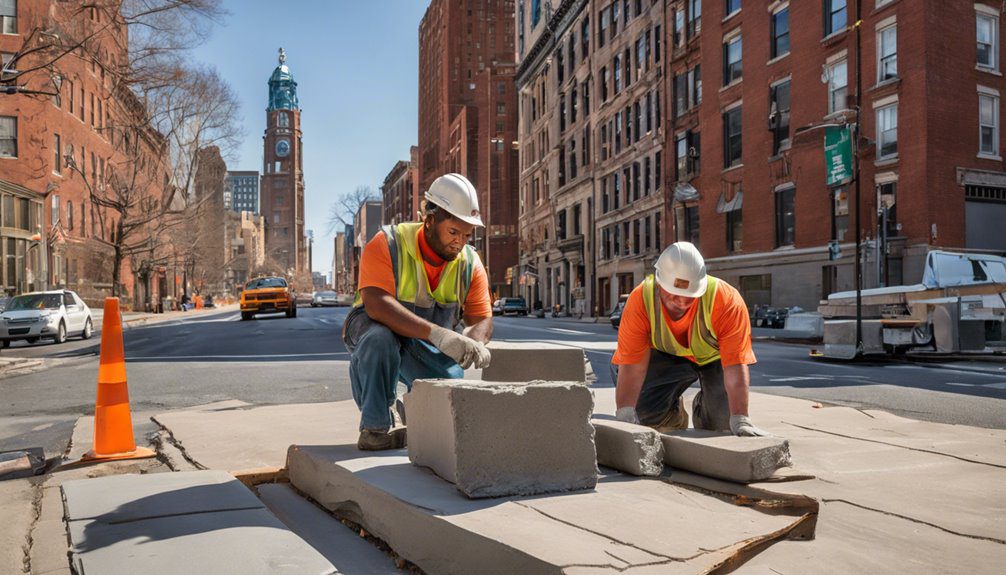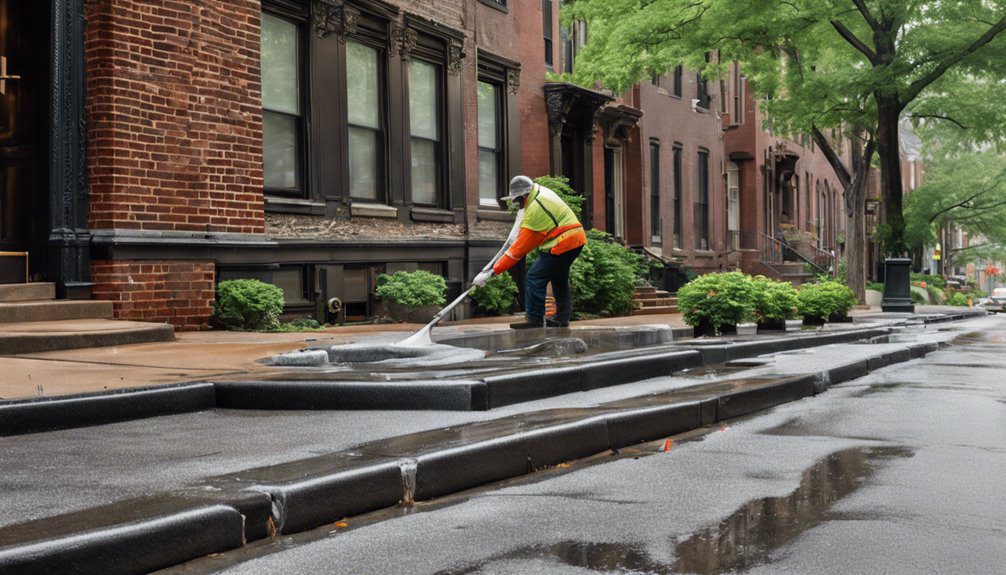If you're a contractor in Philadelphia, understanding the curb setter bond is crucial for your projects. This bond not only safeguards the city and its residents from potential damages but also bolsters your credibility in a competitive market. You might be wondering who exactly needs this bond and what the costs are associated with obtaining it. As you navigate the requirements, consider how this bond can impact your business relationships and project success. What other factors should you keep in mind as you engage with local regulations?
What Is a Curb Setter Bond?

A curb setter bond is a type of surety bond that ensures compliance with local regulations for those involved in the installation of curbs and related infrastructure. If you're planning to engage in curb setting, you'll need to obtain this bond to guarantee your work meets municipal standards.
This bond essentially acts as a safety net, protecting the city and its residents from any financial loss due to non-compliance or negligent work practices.
When you secure a curb setter bond, you're making a commitment to uphold the local building codes and regulations. It's not just a formality; it shows your dedication to quality and responsibility in your work.
Should you fail to meet the required standards, the bond compensates for any damages incurred, ensuring that the city can rectify the situation without bearing the financial burden.
In addition to protecting the city, having a curb setter bond can enhance your credibility as a contractor. Clients often prefer working with bonded professionals, as it demonstrates a level of trustworthiness and adherence to licensing laws and industry standards.
Importance of the Curb Setter Bond
Obtaining a curb setter bond not only fulfills legal requirements but also plays a vital role in your reputation as a contractor. When you're bonded, it signals to clients and the community that you're trustworthy and financially responsible. This assurance can help you stand out in a competitive market, attracting more clients who seek reliable services.
Moreover, having a curb setter bond protects your clients. If any issues arise from your work—like improper installation or failure to meet local codes—your bond ensures that they can recover financial losses. This demonstrates your commitment to quality and can lead to positive word-of-mouth referrals.
Another important aspect is compliance with local regulations. Many municipalities require curb setter bonds, and not having one can lead to penalties or project delays. Additionally, obtaining a curb setter bond enhances your business's credibility, which is crucial for building long-term relationships with clients.
Who Needs a Curb Setter Bond?

Contractors involved in curb setting projects typically need a curb setter bond to operate legally and effectively. If you're a contractor specializing in curb installation, this bond is essential for your business. It demonstrates your commitment to complying with local regulations and standards, ensuring that you perform your work responsibly and ethically.
Municipalities often require this bond to protect the public and guarantee that you'll complete your projects according to the specified guidelines. Without it, you may face penalties, including the potential loss of your license or the inability to bid on projects.
This bond also provides a safety net for clients, giving them confidence that you'll address any issues that arise during your work. If you're involved in roadway construction, landscaping, or any project that requires curb installation, you should consider obtaining a curb setter bond.
It not only fulfills legal requirements but also enhances your reputation in the industry. Having this bond can set you apart from competitors and build trust with clients, making it a crucial aspect of your business operations. Additionally, the bond serves as a form of performance security to ensure project completion and compliance with contractual obligations.
Don't overlook the importance of securing a curb setter bond to ensure your success in the field.
Requirements for Obtaining a Bond
When you're ready to secure a curb setter bond, certain requirements must be met to ensure a smooth application process. First, you'll need to provide proof of your identity and business registration. This typically includes your Social Security number, an Employer Identification Number (EIN), and any relevant licenses or permits that demonstrate your authority to operate in the curb setting business.
Next, you'll likely need to submit a completed bond application form. This form gathers essential information about your business practices and financial stability. It's crucial to be accurate and thorough in your responses to avoid delays.
Additionally, most surety companies will require a credit check. Your credit history plays a significant role in determining your eligibility and the terms of the bond. If your credit is less than stellar, don't worry; you may still qualify, but you might face higher premiums.
Lastly, be prepared to pay a bond premium, which is often a percentage of the total bond amount. Once you've gathered all necessary documents and information, you can proceed with your application, paving the way for your curb setter bond approval. Understanding the regulatory framework of surety bonds in your state can also help streamline the process.
Costs Associated With the Bond

The costs associated with a curb setter bond can vary based on several factors, including the bond amount and your creditworthiness. Typically, you'll pay a premium that's a percentage of the total bond amount. This percentage usually ranges from 1% to 10%, depending on your financial history and the risk you present to the surety company.
If your credit score is good, you might find yourself on the lower end of that scale, making it more affordable. However, if you have a poor credit score, expect to pay a higher premium.
Additionally, keep in mind that other factors like your business's financial stability and experience in the industry can also affect the rate.
You should also consider any additional fees that may be included, such as application fees or renewal fees. It's crucial to read the fine print and ensure you understand all the costs involved.
Before committing, it's wise to shop around and compare quotes from multiple surety companies. This way, you can find the best deal that meets your needs while keeping your project budget in mind. Furthermore, having a strong understanding of license and permit bonds can help you navigate the requirements more effectively.
Consequences of Non-Compliance
Failing to comply with curb setter bond requirements can lead to serious consequences for your business.
First, you may face hefty fines from local authorities, which can quickly add up and strain your budget. These penalties aren't just financial; they can also damage your reputation in the industry. Clients and partners may hesitate to work with you if they see a history of non-compliance.
Additionally, your project could face delays. Without a valid bond, you might be unable to obtain necessary permits, halting work on your site. This not only affects your timeline but can also lead to increased labor costs or lost contracts due to missed deadlines.
In more severe cases, non-compliance could result in legal actions against you. If issues arise from your failure to secure a bond, you could find yourself in court, facing lawsuits that drain your resources and time.
Furthermore, repeat violations might lead to stricter scrutiny and more severe repercussions in the future. Surety bonds protect the interests of the obligees, which underscores the importance of compliance. Protect your business by ensuring you meet all curb setter bond requirements to avoid these potentially damaging consequences.
Tips for Property Owners and Developers

To navigate the complexities of curb setter bonds successfully, property owners and developers should take proactive steps to ensure compliance. Start by familiarizing yourself with the specific regulations in Philadelphia regarding curb setter bonds. Knowing the requirements will help you avoid costly mistakes.
Next, consult with a qualified contractor or engineer who's experience with curb setting. Their expertise can guide you through the technical aspects and ensure that the installation meets city standards. Don't hesitate to ask questions; understanding the process will empower you.
It's also crucial to keep thorough documentation throughout your project. Maintain records of contracts, inspections, and communication with city officials. This paperwork can be vital if you face any compliance issues later on.
Additionally, stay in contact with the local permitting office. They can provide updates on any changes to regulations or requirements that could affect your project.
Lastly, consider securing a curb setter bond early in the project timeline. This proactive approach can save you time and stress, allowing you to focus on successfully completing your development. Furthermore, understanding the surety bond requirements can significantly enhance your project's compliance and credibility.
Conclusion
In summary, securing a curb setter bond is vital for contractors in Philadelphia, ensuring compliance and protecting the community from potential damages. By obtaining this bond, you not only enhance your credibility but also foster trust with clients and local authorities. Remember, staying compliant with local regulations is key to smooth project execution and your reputation in the competitive construction landscape. Don't overlook the importance of this bond; it's an investment in your business's future success.


